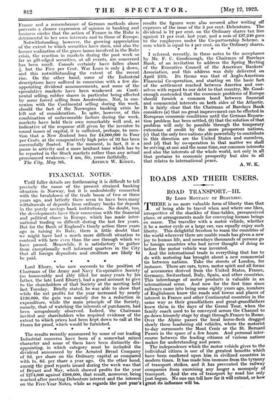FINANCIAL NOTES.
Until fuller details are forthcoming it is difficult to tell precisely the cause of the present strained banking situation in Norway, but it is undoubtedly connected with the breakdown of the trade boom of two or three years ago, and latterly there seem to have been many withdrawals of deposits from ordinary banks for deposit in the purely savings bank institutions. No doubt, too, the developments have their connexion with the financial and political chaos in Europe, which has made inter- national trading so difficult- during the last few years. But for the Bank of England's timely action three years ago in raising its Rate, there is little doubt that we might have had a much more difficult situation to contend with here even than the one through which we have passed. Meanwhile, it is satisfactory to gather from exceptionally well informed quarters in the City that all foreign depositors and creditors are likely to be paid.
Lord Ebury, who now succeeds to the position of Chairman of the Army and Navy Co-operative Society (so honourably and ably filled for many years by his father, the late Lord Ebury), had a good account to give to the shareholders of that Society at the meeting held last Tuesday. Briefly stated, he was able to show that while the net profits for the year increased by nearly £120,000, the gain was mainly due to a reduction in expenditure, while the main principle of the Society, namely, that of watching the interests of purchasers, had been scrupulously observed. Indeed, the Chairman invited any shareholders who required evidence of the extent to which prices had been kept down to call at the Stores for proof, which would be furnished. * * * The results recently announced by some of our leading Industrial concerns have been of a somewhat mixed character and some of them have been distinctly dis- appointing, in which category must be included the dividend announced by the Ae.rated Bread Company of 9d. per share on the Ordinary capital as compared with 1s. 8d. per share a year ago. On the other hand, among the good reports issued during the week was that of Bryant and May, which showed profits for the year of £274,000 against £208,000, that result, moreover, being reached after meeting Debenture interest and the interest on the Five-Year Notes, while as regards the past year's results the figures were also secured after writing off expenses of the issue of the 5 per cent. Debentures. The dividend is 12 per cent. on the Ordinary shares tax free against 11 per cent. last year, and a sum of £37,240 goes to the employees under the Co-partnership Scheme, a sum which is equal to 4 per cent. on the Ordinary shares. * * * * I referred, recently, in these notes to the acceptance by Mr. F. C. Goodenough, the Chairman of Barclays Bank, of an invitation to address the Spring Meeting of the Executive Council of the American Bankers' Association, and this address was duly delivered on April 25th. Its theme was that of Anglo-American Financial Co-operation, and starting on the basic fact of the settlement reached between America, and our- selves with regard to our debt to that country, Mr. Good- enough contended that the economic problems of Europe should furnish a common bond between financial and commercial interests on both sides of the Atlantic. It is fairly clear that the Chairman of Barclays Bank considers (a) that no great improvement can be effected in European economic conditions until the German Repara- tion problem has been settled, (b) that the solution of that problem will only be possible through the temporary extension of credit by the more prosperous nations, (c) that the only two nations able powerfully to contribute in this direction are the United States and ourselves, and (d) that by co-operation in that matter we shall be serving, at one and the same time, our common interests and also the interests of the whole world, not only in all that pertains to economic prosperity but also in all that relates to international peace.
A. W. K.


















































 Previous page
Previous page